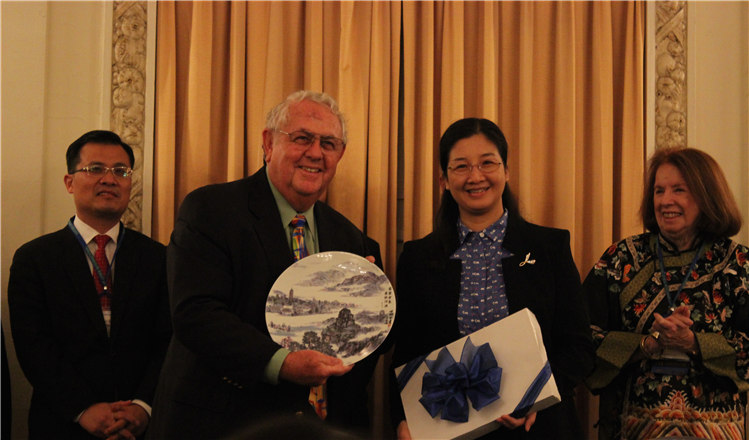US imprudently making trouble out of nothing
Updated: 2015-10-28 07:34
(China Daily)
|
||||||||
 |
|
Chinese Foreign Minister Wang Yi is interviewed by media in Vienna, Austria, on July 14, 2015.[Photo/Xinhua] |
Bsending its warship within 12 nautical miles of China's isles in the South China Sea, the United States is raising tensions in the waters and sending a dangerous signal to the region.
On Tuesday, the US warship USS Lassen illegally entered waters near Zhubi Reef, part of China's Nansha Islands, without the permission of the Chinese government. Such a blatant provocation was naturally met with strong condemnation from China, which deems the US move as a threat to China's sovereignty and security interests.
To justify this reckless move, high-ranking US officials have been raising their voices recently accusing China of militarizing the South China Sea and claiming the US operation is to exert "freedom of navigation" in the waters.
These are just pretexts the US is using to mislead the public and confuse right with wrong.
China has repeatedly said it has no intention of militarizing the Nansha Islands in the South China Sea. All its deployments at the islands and reefs are necessary, limited and defense-oriented. As a nation that relies heavily on the sea lanes in the waters, militarization would threaten, instead of serving, its interests in the region.
As to freedom of navigation and overflights in the waters, they have never been a real issue of concern. China has reiterated many times that its reclamation work is primarily for civilian purposes and does not in any way hamper freedom of navigation.
Yet, these words have apparently fallen on deaf ears. By challenging a threat that does not exist, the US move is creating a bigger and more real threat itself. By flexing its muscle on China's doorstep, the US is using coercion to challenge China's legitimate territorial claims.
The US warship displays exactly who is the real hand pushing the militarization of the South China Sea.
The US' so-called freedom of navigation operations also go against its own public statements that it takes no stand over the territorial claims in the South China Sea.
The US calls itself a Pacific country and claims it too has a stake in peace and stability in the region. If that is the case it should be playing a more constructive role in the waters, rather than stirring the waters at the risk of regional peace and stability.
If the US still deems itself a responsible power, it should refrain from making further provocations.

 They live in Russia, but shop in China to save money
They live in Russia, but shop in China to save money
 Survivors receive treatment after strong earthquake in Pakistan
Survivors receive treatment after strong earthquake in Pakistan
 Ten cancer-causing foods you probably eat every day
Ten cancer-causing foods you probably eat every day
 How to enjoy pumpkin without carving it
How to enjoy pumpkin without carving it
 Extraordinary masters of folk art made famous on the Internet
Extraordinary masters of folk art made famous on the Internet
 Sister cities mingle in Chicago
Sister cities mingle in Chicago
 Girl with a sand painting dream
Girl with a sand painting dream
 Decorating benefactors make a dorm a cozy home
Decorating benefactors make a dorm a cozy home
Most Viewed
Editor's Picks

|

|

|

|

|

|
Today's Top News
Tu first Chinese to win Nobel Prize in Medicine
Huntsman says Sino-US relationship needs common goals
Xi pledges $2 billion to help developing countries
Young people from US look forward to Xi's state visit: Survey
US to accept more refugees than planned
Li calls on State-owned firms to tap more global markets
Apple's iOS App Store suffers first major attack
Japan enacts new security laws to overturn postwar pacifism
US Weekly

|

|








